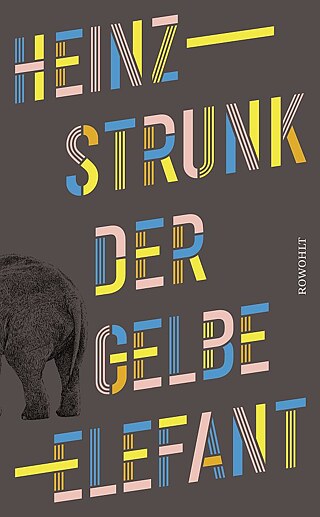Cherrypicker
Anti-Heroes Everywhere
Hardly any other author writes as bluntly about the misery of the everyday as Heinz Strunk. His new collection of stories is no exception.
By Holger Moos

Some people criticise Strunk’s writing style, accusing him of drawing cold, merciless pictures of his characters. Strunk counters this criticism by saying that he merely looks very closely, but perhaps his view of people is a tad bleak. In an interview on Bayern 2, Strunk recommended that his critics spend a day at a motorway service station, after which they might judge him somewhat more leniently.
Strunk thus considers himself a precise literary recorder of his environment – with an eye for the inscrutable. After his last novels Es ist immer so schön mit dir (2021) and Ein Sommer in Niendorf (2022), both nominated for the longlist for the German Book Prize, the collection Der gelbe Elefant (The Yellow Elephant) has now been published with 30 short stories – some of them only a few sentences long.
Croquettes and other catastrophes
The very first story, Kroketten (Croquettes), is downright cringe-worthy. As they do every Friday, two couples go to Bacchus, their favourite Greek restaurant, because the croquettes that lend the story its title are (supposedly) homemade, delicious and cheap here. The criteria for their favourite restaurant are correspondingly simple: “Croquettes, cosiness ..., easy to reach on foot.” The couples chat about holidays and other trivialities, but then comes the shocker: the restaurant is out of croquettes! The mood changes, they run out of subjects to talk about, they find each other annoying. Although the coveted side dish is later found, the evening is ruined. Not even the obligatory on-the-house ouzo is accepted; they quickly take their leave with flimsy excuses, have digestive problems afterwards, and are glad that “no socialising is planned” for the following day.Grotesques are also part of Strunk’s repertoire, such as in one of the shortest stories, in which, while jumping off the roof of a high-rise, a suicide holds his nose, “like a child jumping off a one-metre board.” In the story Eisengreis, a 75-year-old bodybuilder cannot bear to witness his own physical decline, but experiences it in an extremely painful way. The exaggeration of the old man’s physical and mental agonies reminds Jens Uthoff of the taz of a “Kafka parable with a good dash of Hamburg humour.”
In Steilgehen, Strunk paints the protagonist as a bland incel. Mark is stingy, short, chubby, and spineless. Since he hasn’t had a relationship in a long time, he spends hours at a time on dating apps, unsuccessfully of course. During a date, he thinks. “She sees through me, he thinks in a brief, lucid moment, and is quite shaken. Sees through me ... and doesn’t like me. He doesn’t know what exactly she sees through, but he feels it.” All he has left afterwards are sex fantasies, masturbation, misogyny, and distraction by TV comedians.
Dried-fruit granddads and schoolboy beards
The book is worth reading for the spot-on descriptions alone, especially of physicality: Pensioners who keep fit and slim through endurance sports are “dried-fruit granddads.” Facing the imminent ending of their relationship, a woman describes her partner: “She finally wants to be rid of his soft belly, his hairy fingers, the idiotic schoolboy beard, insipid voice, and the vinegary effluvia of his body.”The thirty stories are thematically varied, some sketch-like, not all equally polished. Considering this collection, one could debate whether Strunk exaggerates or just writes down exactly what he sees. In any case, Der gelbe Elefant delivers classic Strunk material: anti-heroes everywhere.

Hamburg: Rowohlt, 2023. 208 S.
ISBN: 978-3-498-00350-0